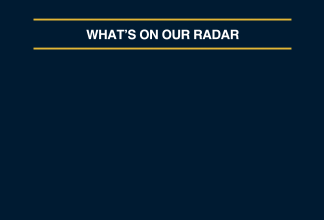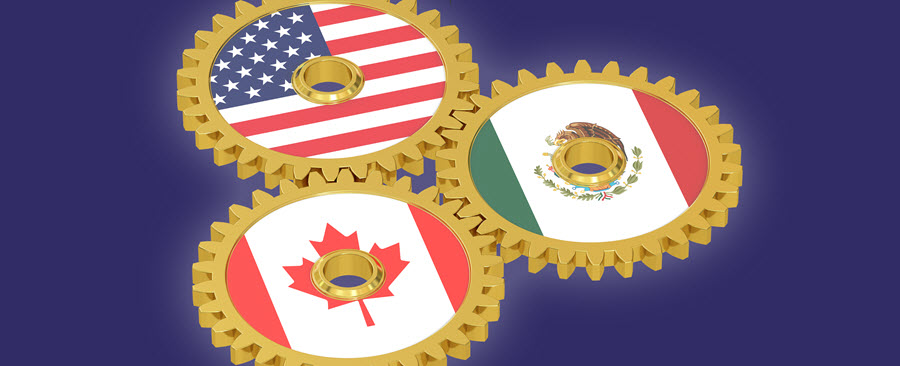What's Next for Canada at the NAFTA Table?
Written by The Content Team
Published on September 7, 2018
minute read
Share:
Canadian Prime Minister Justin Trudeau recently said "No NAFTA deal is better than a bad NAFTA deal." U.S. President Donald Trump, meanwhile, tweeted "There is no political necessity to keep Canada in the new NAFTA deal. If we don't make a fair deal for the U.S. after decades of abuse, Canada will be out."
No wonder people on both sides of the border – employees, manufacturers, politicians and farmers alike – are wondering about the future of the 24-year-old North American Free Trade Agreement (NAFTA).
After a high-level trade plan with Mexico was announced at the end of August, economists from RBC Global Asset Management (GAM) dissected the likelihood of a bilateral trade deal leaving Canada out in the cold. Canada went back to the negotiating table and now, around two weeks later, is still there. Here's a rundown of what's being discussed and how the RBC GAM economics team now views potential outcomes.
Where Do We Stand?
"We are not surprised that NAFTA negotiations remain incomplete despite a tentative deal between the U.S. and Mexico and considerable pressure for Canada to climb aboard by last Friday," wrote Eric Lascelles, Chief Economist at RBC GAM, in his weekly economic update. In Lascelles' view, there were two key stumbling blocks:
- The sheer number of unresolved issues
- The fact that the threat of proceeding without Canada was simply not universally credible
The initial negotiating deadline has come and gone. With all that's happened in the last couple of weeks, Lascelles has now updated his outlook, although not dramatically. "While it's not completely impossible that a bilateral deal between the U.S. and Mexico could eventually be the end result, it would be bizarre to give Canada just a week to iron out remaining differences with the U.S. when Mexico got more than a month," he wrote. Added to that is the fact that the White House has a mandate from Congress to negotiate a trilateral, not a bilateral, deal. The White House would have to go back to Congress for permission to negotiate a bilateral deal.
Ultimately, Lascelles notes, all parties are aware that excluding Canada would hurt all three economies.
Let's Talk About…Dairy
There are a number of key sticking points in the negotiations that are undoubtedly causing some heated behind-closed-door debates. Of those, the dairy sector has been in the limelight.
While not guaranteeing a complete hold on the current system, Trudeau has told the media, "I'm not going to negotiate in public, but what I have said time and time again is that our government, and I personally, will stand up to defend supply management and our dairy farmers."
RBC GAM economists view a partial opening of North American dairy markets as a possibility. "President Trump is reported to want the Canadian dairy market completely opened. This could end up being a sacrifice Canadian politicians are willing to make, though presumably only as a last resort," says Lascelles.
Two other key areas that Canada has a keen eye on are dispute resolution and the so-called sunset clause. Canada does not want to budge on dispute mechanisms. According to Lascelles, "It is indeed fair to argue that absent these, NAFTA's very existence would be debatable as a country/company could violate NAFTA rules with impunity." Simply put, without a way to handle violations, the agreement wouldn't hold much weight.
A sunset clause would automatically end the agreement after a set period of time unless all three parties agree to continue. In the announced deal with Mexico, the U.S. had already made concessions on this.
A few other items that Lascelles says remain to be addressed include:
- Intellectual property rights
- The possible banning of cultural exemptions such as Canadian content minimums for certain media
- Canada's cross-border shopping limits
The Bottom Line
According to Lascelles, "The U.S. is now negotiating seriously and the remaining disagreements are not huge." Still, if a deal is to be reached quickly (in a week or two), it will likely be high-level, with "gobs of subsequent negotiations to hash out the details." The RBC GAM economics team believes there's still a 60 per cent chance that a new deal will be struck (35 per cent chance of a "bad deal" and 25 per cent chance of a "compromise"). And finally, after all the ongoing hard-nosed negotiations, the team still gives 25 per cent odds that the pre-existing NAFTA deal prevails.
RBC Direct Investing Inc., RBC Global Asset Management Inc. and Royal Bank of Canada are separate corporate entities which are affiliated. RBC Direct Investing Inc. is a wholly owned subsidiary of Royal Bank of Canada and is a Member of the Investment Industry Regulatory Organization of Canada and the Canadian Investor Protection Fund. Royal Bank of Canada and certain of its issuers are related to RBC Direct Investing Inc. RBC Direct Investing Inc. does not provide investment advice or recommendations regarding the purchase or sale of any securities. Investors are responsible for their own investment decisions. RBC Direct Investing is a business name used by RBC Direct Investing Inc. ® / ™ Trademark(s) of Royal Bank of Canada. RBC and Royal Bank are registered trademarks of Royal Bank of Canada. Used under licence. © Royal Bank of Canada 2018. All rights reserved.
The views and opinions expressed in this publication are for your general interest and do not necessarily reflect the views and opinions of RBC Direct Investing. Furthermore, the products, services and securities referred to in this publication are only available in Canada and other jurisdictions where they may be legally offered for sale. If you are not currently resident of Canada, you should not access the information available on the RBC Direct Investing website.
Explore More

Here’s What Every Canadian Should Know About Estate Planning
Insights from Leanne Kaufman to help you feel more confident as you plan
minute read

3 Things We're Watching This Week
What the Inspired Investor team is watching
minute read

What’s Driving the Recent Surge in Gold Prices
Here are some things to watch with the gold market
minute read
Inspired Investor brings you personal stories, timely information and expert insights to empower your investment decisions. Visit About Us to find out more.







